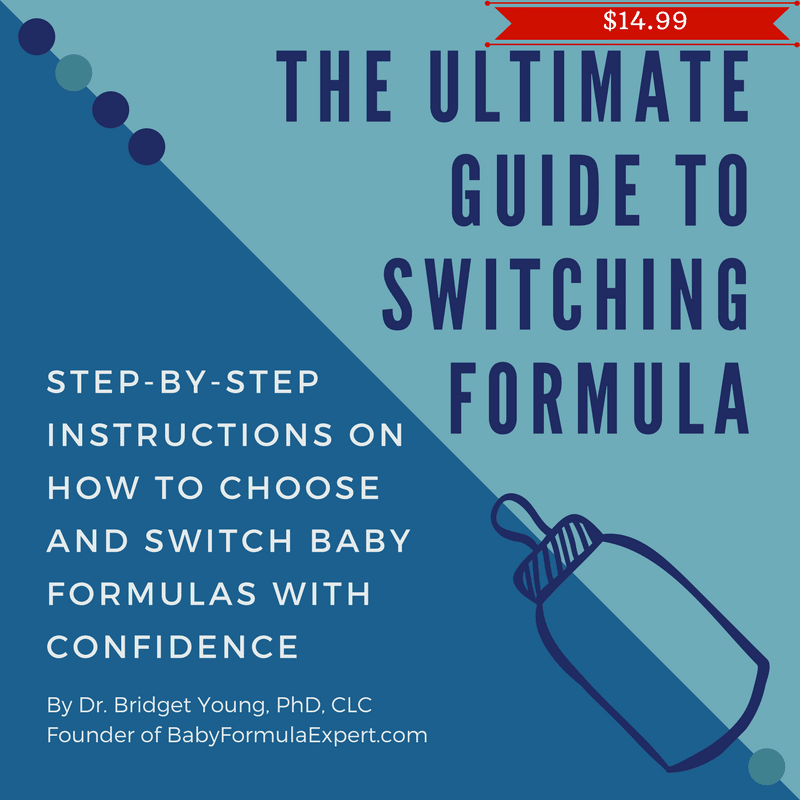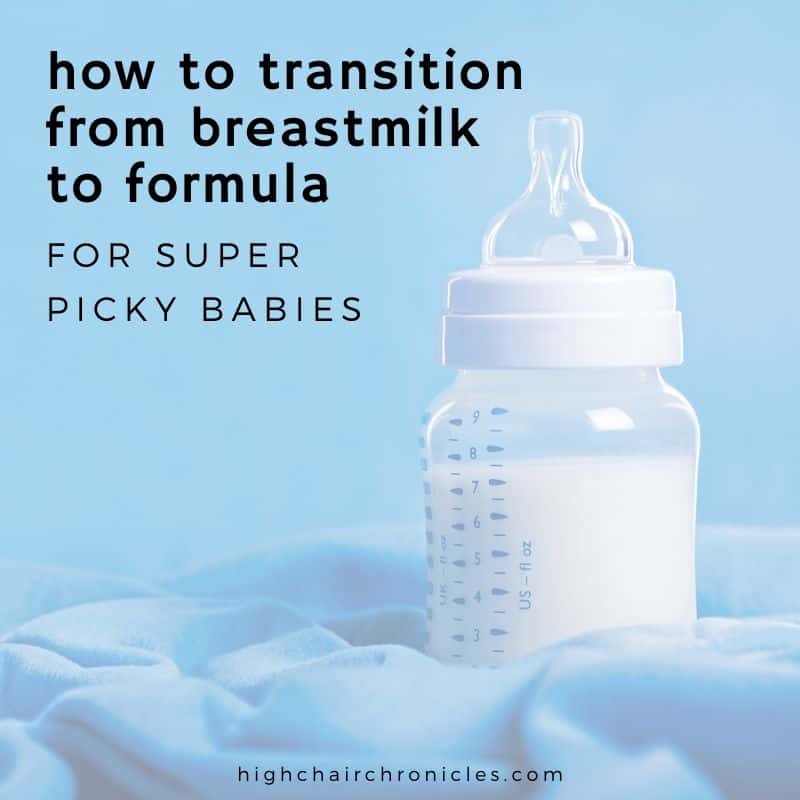How To Make A Switch
If you are switching formulas on your pediatrician’s recommendation you will probably be advised to discontinue the old formula and switch to the new one all at once.
If, however, you are switching for other reasons such as price or convenience, you can give the new formula a try and see how your baby likes it.
Keep in mind that it may take a few feedings before your baby gets used to the taste of a new formula.
Try making a gradual change if your baby does not seem to like the new choice of formula. You can start with a combination of three parts old to one part new, and when your baby accepts that, move to half-and-half.
Keep gradually changing the ratio until you are feeding only the new formula. You may want to buy a small container of the new formula until you know for sure you want to stick with it.
If you are concerned about gassiness, stick to one brand for at least a week or two to see if there are any changes in gas, stool, spit-up or burping. Your baby’s digestive system needs this long to adjust to the new diet.
With a little planning, even if cost and convenience are how you are choosing a formula, you should be able to stick with one brand in the long run.
Topics Covered For Formula Feeding
If your baby is healthy, skip the What to Do section. Go directly to the topic number that relates to your question for advice:
Switching Formula From One Brand To Another
Shae Rickards Dietitian Specialising in Paediatric Nutrition Next
Sometimes there is a need to switch infant or follow on formula brands, and this can be cause for anxiety in some parents. Before you make this decision, it is important to speak with your doctor or MCH Nurse so they can advise you, based on your baby and your individual circumstances. Some particular considerations that should be made are if they were premature or of low birth weight, or they have specific nutrition needs.
Babies digestive systems are quite immature so the transition should take place slowly so they have plenty of time to adapt to the formula. The taste may also be quite different so this needs to be planned for also.
The following plan relates to a 4-6 month old baby, having four feeds a day. This is by no means set in stone and is just one example of how to do it, and can serve as a useful guide when starting out.
While transitioning you should take note of your babies bowel movements and urine output to ensure they are getting enough to drink. You can expect some change in their stools, either becoming softer or a bit firmer, but it should not be dry and solid, or a watery-like consistency.
They should have six wet nappies a day, which should be soaked and contain pale or colourless urine. If the urine is scant or yellow you should check the instructions on the tin again to ensure the formula and water ratio is correct.
Don’t Miss: How Many Oz Should A Newborn Eat Of Formula
Formula Facts: Whats In It For Baby
The three forms of formula — powders, concentrates, and ready-to-use — are based on different ingredients:
Milk-based baby formulas
Made with cowâs milk, vegetable oils , vitamins, and minerals — and usually iron-fortified — milk-based formulas are appropriate for healthy, full-term babies.
Soy-based baby formulas
Made with soy protein, vegetable oils, corn syrup and/or sucrose , and sometimes iron, these formulas are good for babies with lactose intolerance who canât take milk-based formulas, or those who have allergies to the whole protein in cowâs milk or are on a vegetarian-based diet. Soy infant formulas arenât recommended for low-birth-weight or preterm babies. Keep in mind that there may be some cross reactivity between soy and milk formulas, especially if the baby is allergic to milk-based formulas.
Specialty baby formulas
This is a big category, comprising a range of products — infant formulas for low-birth-weight babies, low-sodium formulas for babies who need a restricted salt intake, and formulas thickened with rice starch for babies with reflux.
“Predigested,” or hydrolyzed protein formulas, are made for babies who canât tolerate or have allergies to the whole proteins in cowâs milk and milk-based formulas. Others are for babies with medical conditions that keep their bodies from processing certain proteins or fats.
What Are Signs A Formula Isnt Working

First things first, if youre worried baby is having an issue, call your pediatrician.
Second, know that just like there is no perfect formula, there is no perfect baby. So while some signs from baby may be due to the formula, they also might not be, which doesnt make the process easier. Signs that you shouldnt ignore though and again call your doctor right away are a severe rash, blood in the stool, which can be either bright red, or causing it to either be dark or with black flecks or chunks, or chest congestion with mucus or wheezing after eating. These are more severe allergic reactions to formula that wed want to adjust right away.
What about colic and acid reflux? Dr. Young shares that those are actually very normal and while we wish babies dont have to suffer, their health is usually not in danger.
One more thing about calling your doctor remember, they work for you! They are used to parents calling at all hours, and theyd much rather hear from you than not hearing from you until two days later when the problem has gotten worse. Youre not bothering your doctor, and if they make you feel as if you are, find a new provider.
You May Like: How Many Newborn Cloth Diapers Do I Need
What Is Cluster Feeding
Cluster feeding is very common and normal in babies who are breastfed. Cluster feeding is when a baby wants to nurse more often than every 2 to 3 hours. When a baby is cluster feeding, they eat several, small meals in a short period of time. Cluster feeding tends to happen most often in the evenings and when your baby is experiencing growth spurts.
Cluster feeding helps your body boost your milk supply during a growth spurt so your baby gets exactly what they need. It also increases skin-to-skin time, which has emotional benefits for both baby and parent.
While cluster feeding can feel exhausting in the moment, it wont last forever.
/10 Theyre Having Trouble Sleeping
Newborns are known for sleeping a lot after theyre born and Cafe Mom reports that a sign that you might need to change your babys formula is if theyre having trouble sleeping. Sleep is one of the most important things for babies as theyre growing a lot and that takes a lot out of them. This means your baby should be getting about eight to nine hours of sleep during the day and eight hours of sleep at night. So, if you notice that your baby is being extremely fussy and is not sleeping then you may need to try giving them a different formula.
Also Check: What To Do When Newborn Has Diarrhea
Formula Mob Family #: Hypoallergenic
These are the top-tier expensive formulas that are generally given to babies with severe allergies and colic.
They are completely lactose- free, and the proteins are so small that your baby only has to absorb them. There is almost no digesting at all. They are made so that ALL the proteins are already broken down.
If Your Baby Refuses The Bottle
Some babies take to the bottle better than others. If yours rejects the bottle at first, try experimenting with different brands of bottles and nipples until you find one your baby likes. Or, have a caregiver or your partner offer the bottle, since your baby may associate you with breastfeeding. Give your baby a bottle at a feeding when theyre not overly tired and hungry since they may be more willing to accept it then.
Breastfeeding is amazing!!!! But having a second set of boobs is always helpful. Enfamil® mom
Also Check: What To Put On Newborn Dry Skin
Switching Baby Formula Everything You Need To Know About How To Switch From One Baby Formula To Another
Our editorial team personally selects each featured product. If you buy something through our links, we may earn an affiliate commission, at no cost to you.
Formula changes happen for many reasons. There are allergies and medical issues as well as formula shortages and recalls. Babies can often switch formulas with no problems even if that has to happen immediately due to unforeseen circumstances. You may be wondering if switching formula can be done quickly or how long it takes for a baby to adjust to a formula change?
We spoke to Dr Lauren Crosby, board certified pediatrician, AAP Spokesperson and Bobbie Medical Advisor, to get all the answers when it comes to making a formula switch. She shares her steps in making the change and assures us that YES a formula switch can happen cold turkey.
How To Make The Switch From One Baby Formula To Another
Dr Crosby: If your child is on a cow milk-based formula, you can just switch over to another cow milk-based formula. If your child is on a special hydrolyzed/ hypoallergenic formula, you want to switch to the same type of hypoallergenic formula. Some are more hypoallergenic than others so if you are not sure what is equivalent, definitely check with your childs doctor.
Read Also: How Many Oz Of Formula For Newborn
Would Organic Work Better
Dr. Young is often asked, Is organic better? but she cautions that this is not the first question parents should be asking. Instead, focus on the protein size and source as discussed earlier because that has a lot more impact on their baby at the beginning. If you could have the non-organic protein source thats ideal or the not ideal protein source that is organic, go with the ideal protein source.
That said, if youve done your research and found the protein source you want and have two options, one organic and one not, then Dr. Young says Of course Id recommend organic, if your budget allows. If it doesnt, that is NO problem. She cautions parents not to feel bad or stress if finances dont allow for organic.
More Questions & More Answers

We know that between last week and this blog post weve barely scratched the surface when it comes to everything there is to know about baby formula. Thankfully, thats what BabyForumulaExpert.com is for! Here are some great resources Dr. Young has available, for free, on her site. Amazing information to bookmark for future reference.
Also Check: How Does Newborn Hearing Test Work
Is It Okay To Use Generic Formula Brands
Experts say yes and this is a great option for most babies. Look at the ingredients in your formula and see how they match up with an alternative formula, Dr. Woods says. His advice: Focus on the first five or so ingredients, and look to make sure the total number of ingredients are similar.If youre using a brand that doesnt have a comparable generic version and cost is an issue, Dr. Fisher recommends going on the companys website to see if they offer coupons you can use.
How Much Should You Feed Baby
Dr. Young would encourage you to speak with your doctor for an accurate estimate. What youll be looking for to see if your quantity of formula is right is a good output of urine, depending on the babys age, and stool. The rule of thumb for exclusively formula-fed babies is to start with 2 ½ ounces per pound of body weight with a max of 32 ounces of formula, which is the most any baby should need before 6 months old. This is just a starting point. Some babies will naturally drink more, and some will naturally drink less than this amount. Babies intakes will also increase with growth spurts and then decrease. A lot of variation that is normal.
Dr. Young still encourages feeding on demand, just like you would feed a breastfed baby. Of course the older they get, the larger their bottles will be. Stop feeding them when they start to exhibit cues that they are full such as turning head away from the bottle, pushing the bottle away, squirming and attempting to move or arching their back away from bottle. Dont encourage them to finish the bottle when they are full.
Don’t Miss: How To Get Newborn Birth Certificate Ohio
Should You Make Your Own Baby Formula
While the current formula shortage is stressful, it’s crucial to remember that homemade baby formula is never a safe option. That’s because commercially manufactured formula is carefully regulated and designed to meet your infant’s special nutritional needs. It’d be impossible to safely recreate the exact formula your baby needs at home.
How To Switch Baby Formula
Switching baby formula should be done with a pediatricians expert guidance. Typically they will advise a gradual transition to account for sensitivity to new formulations.
Your pediatrician may also advise trying a combination of two-thirds of the current formula and one-third of the new products. When the baby accepts the combination, parents may then be advised to mix in a ratio of 1:1.
Professionals recommend switching to a store or generic brand formula equivalent to what the child was taking initially if possible. If you cannot find the generic brand, discuss alternative options with your pediatrician.
FDA regulated commercial brands in the U.S. are generally considered safe options. Homemade baby formula, however, can pose serious health risks to infants, as it may lack the necessary mix of nutrients.
Also Check: Can My Newborn Hear Me
When To Switch To Sensitive Baby Formula
Dr Crosby: If your baby is very fussy, spits up constantly, is not gaining weight or feeding well, has blood in their stool, is very gassy or sleeps poorly because she seems to be uncomfortable, its time to talk to your pediatrician and see if its time to change to a sensitive infant formula.
There are different types of sensitive formulas depending on the babys symptoms. Some are truly hypoallergenic meaning the proteins are broken down so they can be digested more easily. These are for babies with cow milk protein allergy. Other formulas contain partially hydrolyzed proteins which can work for babies who have tummy symptoms like gas and/or fussiness and/or spit up and/or constipation but not a true milk allergy, and the symptoms are not as severe. Some formulas are made for lactose sensitivity but babies in general dont have lactose intolerance so typically if that formula helps, it is because it also has some of the proteins broken down for easier digestion.
Side Effects Of Switching Formula Brands
Although it’s safe to change your baby’s formula brand for a variety of reasons, including the current formula shortage, you may notice some changes in your infant. “Babies might get constipated, poop more frequently, have their poop’s consistency change, or be gassy. It can take a week or so for a baby to adjust to the change,” says Dr. Swanson.
According to Dr. Young, parents can wait 10 days before deciding whether a new formula is not working. Stop using a formula immediately if you notice any red flags, such as trouble breathing or bloody stool.
Also Check: How To Get Full Custody Of A Newborn
Formula Feeding Myth #: If My Baby Has A Cow’s Milk Allergy Theyll Need To Be Dairy
Actually, cow’s milk allergies are usually temporary and outgrown by the time your little one turns five.
These are the five most common formula-feeding myths, but plenty of other myths are out there. If you still have formula questions about breastfeeding vs. formula-feeding, here are some other things you might want to know.
-
Maybe your babys a champion eater. Lucky you! But if your kiddo is…
Read full article
-
Common Feeding Problems in Infants: Understanding the Differences
Colic. Lactose intolerance. Cow’s milk allergy. Learn more about the…
Read full article
-
Need to talk to your pediatrician about feeding issues? Weve got…
Read full article
Formula Mob Family #: Bovine

This formula family has the most members, because most of the standard baby formulas are based on cows milk .
If your baby doesnt have any health issues and is drinking formula, hes most likely drinking a formula that is built around the cows milk dairy proteins.
So if youre using Good Start and want to try switching to a baby formula like Similac, go for it. Watch your baby carefully for signs of fussiness the first day, but generally the transition is pretty easy.
Recommended Reading: What Do I Need To Buy For My Newborn
Stage 1 And Stage 2 Formulas
Cows milk-based baby formulas for babies up to 6 months of age are called stage 1 or starter formulas. You can use stage 1 formulas from 0-12 months old.
From 6 months, you can choose stage 2 or follow-on formula, but you dont need to change to stage 2. These formulas arent better for your baby than starter or stage 1 formulas.
Signs You Might Need To Switch Baby Formulas
Parents should start their babies on a standard milk-based formula unless they have a medical condition, such as an allergy to cows milk, that warrants the use of a specialized variety, says Jessica Gust, a pediatric dietitian and founder of Element Nutrition Co. for Kids in Arroyo Grande, California.
If their baby isnt tolerating a standard formula, the best formula to change to depends on the symptoms, she says. There are several potential signs a baby isnt tolerating their current formula well.
Also Check: How To Choose A Car Seat For Newborn
